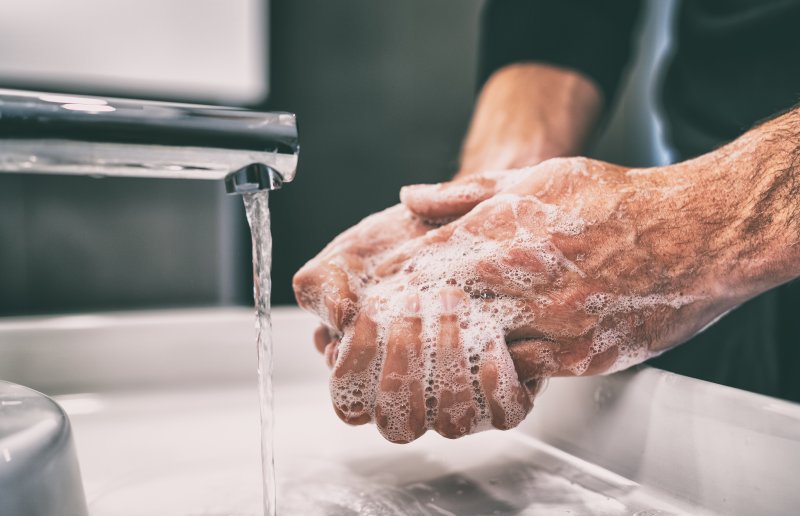
Proper handwashing has always been a necessity. However, with the spread of COVID-19, it has become even more important. That’s because infection can easily be spread via the hands, as you can unconsciously touch your eyes, nose and mouth, the three main entry points for COVID-19. Read on to get some effective handwashing tips from your dentist in Dublin, and to learn how to fortify yourself as best as possible.
The Five Steps to Effective Handwashing
When you wash your hands properly, you’re not only helping to prevent the spread of COVID-19, but to also protect yourself and others from viral illnesses like cold and flu. Here are five easy steps to always follow:
- Wet – The first step is to thoroughly wet both hands, as this will allow for sufficient distribution of the cleaning agent.
- Lather – After applying a generous amount of soap to your hands (including the inside, back and fingertips), wash for at least 20 seconds. You should pay special attention to your fingertips, as they often are the first part to touch the face, nose and eyes.
- Scrub – When it comes to removing bacteria, friction is your best friend. By scrubbing your hands together, you can remove more debris and achieve the cleanliness you’re looking for.
- Rinse – After thoroughly washing, rinse your hands under water to remove any soap.
- Dry – Finish by completely drying your hands. It’s best to use disposable towels, as to prevent any lingering germs.
When Should You Wash Your Hands?
There is never a bad time to wash your hands. However, it’s especially important to do so in these situations:
- After shaking hands
- After touching garbage
- After putting on your shoes
- Before and after treating a cut or wound
- Before and after performing oral hygiene
- After returning home from a public outing
- After blowing your nose, coughing or sneezing
- After a bathroom visit, whether public or at home
- After touching an animal, animal feed or animal waste
- Before and after caring for someone at home who is sick
- Before, during and after preparing food, especially raw food
- After changing diapers or cleaning up a child who has used the toilet
- After using public computers, touching public tables and countertops, cash and coins, ATM’s, etc.
When Should You Use Sanitizer?
The most important thing to know about sanitizer is that it isn’t a substitute for handwashing. However, it is an effective means of protecting against the spread of germs and bacteria when you’re not able to wash your hands immediately. For effective results, you should look for products that contain at least 60 percent alcohol and be sure to use a dime-sized serving.
While COVID-19 has definitely disrupted lives, the good news is that there are some simple ways to fight back, and proper handwashing is one of them. By expending a little more time and effort, you can feel safe and secure.
About the Author
Dr. Eric Buck is a graduate of The Ohio State University College of Dentistry. He understands the unique challenges that COVID-19 has posed, which is why he and his staff are taking every precaution to provide patients with the safest and most effective care possible at Distinctive Smiles. Dr. Buck can be reached for more information through his website.
